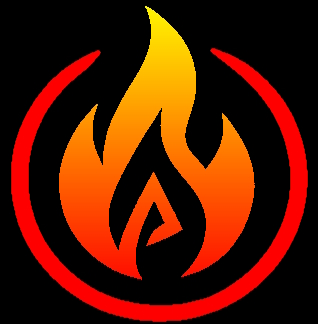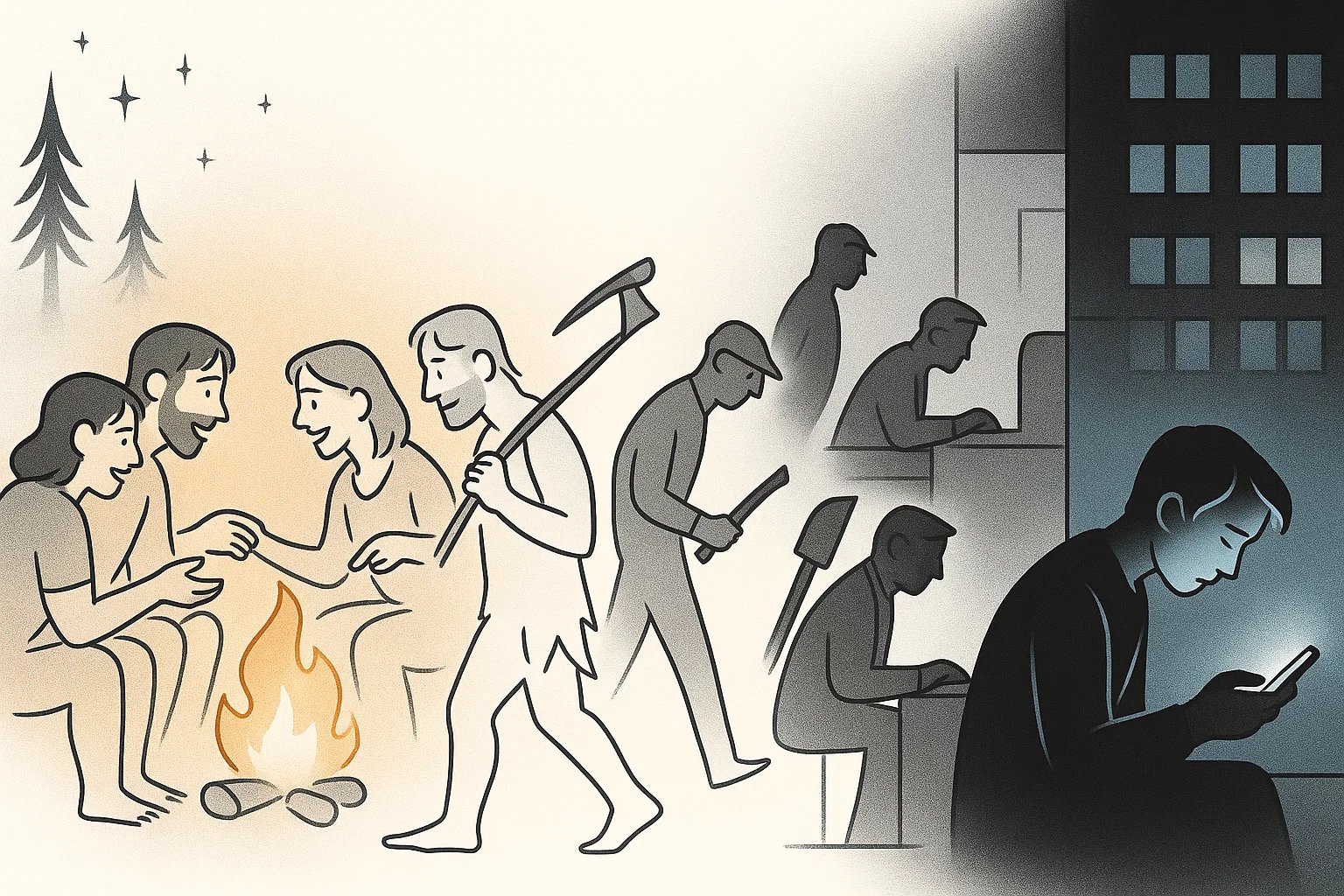We live in an age of unprecedented connectivity, yet a quiet epidemic of loneliness defines much of our modern experience. Why, despite all our advancements and conveniences, does a pervasive sense of emptiness and disconnection persist? In this post, we’re going to pull back the curtain on this paradox, tracing the historical journey that led us away from the tribal connections our biology craves. We’ll explore the disorienting mismatch between our Stone-Age brains and our hyper-digital world, and uncover how our pursuit of comfort has inadvertently birthed a new kind of suffering. Ultimately, we’ll affirm that the yearning for a genuine tribe isn’t nostalgia, but a fundamental biological imperative essential for our well-being and resilience.
In the last post, we talked about The Ache We All Feel: The Paradox of Prosperity. We pulled back the curtain on that strange, unsettling truth that despite living in a world promising us everything, comfort, convenience, boundless connection, many of us feel an increasing sense of emptiness, disconnection, and a quiet, persistent numbness. We explored the “Achievement Hangover,” realizing that external successes, no matter how shiny, often fail to deliver the internal fulfillment our souls truly crave. We looked at how technology, ironically, has offered a false promise, with simulated connections only deepening our isolation, trapping us in curated feeds and manufactured comparisons. And ultimately, we affirmed that gut intuition many of us share: that something essential has been tragically lost in our relentless pursuit of comfort and convenience. We started to feel that the gnawing void isn’t a personal failing, but a symptom of a deeper, systemic issue.
Now, let’s dig into that “deeper issue.” Let’s trace the lines of that loss, because to understand where we’re going, we first have to understand where we came from, and how far we’ve drifted.
The Historical Arc of Disconnection: From the Campfire to the Cubicle
For hundreds of thousands of years, our species lived in small, intimate groups. Life was brutal, short, and precarious. Danger lurked everywhere. But within those dangers, within the necessity of relying on one another for every scrap of survival, something profound was forged: an unbreakable bond. Every day was a masterclass in interdependence. If you failed to contribute, if you betrayed the trust, the consequences were immediate, often fatal. There was no social safety net; there was no digital escape. Your tribe was your life raft.
Then, about 12,000 years ago, came the Agricultural Revolution. Suddenly, we could settle down. We could accumulate. We could store surplus. This felt like progress, and in many ways, it was. But it also birthed the idea of individual ownership, of property, of a life separate from the constant, urgent pulse of the collective. Villages grew into towns, towns into cities, and the direct, reciprocal relationships that defined our existence began to thin. We moved from knowing everyone, truly knowing them, to living among strangers.
Fast-forward to the Industrial Revolution around 1760, and the atomization accelerated. Factories pulled families apart, turning individuals into cogs in a vast, impersonal machine. The village elder was replaced by the boss. The community feast was replaced by the packaged meal. The close-knit ties of kinship were replaced by the coworker who might disappear on a whim.
We began to specialize, fragment, and become highly efficient at very narrow tasks, losing the broad, adaptive skills and the deep, multi-faceted relationships that defined our ancestors’ lives. Our loyalty shifted from the kinship circle to the corporation, to the nation-state, to the abstract ideal.
And now, here we are, in the Digital Age. We’re more “connected” than ever before, yet arguably more alone. Our lives are sliced into the tiny little boxes of individual cubicles, individual screens, individual self-help journeys. We scroll through endless feeds of curated lives, believing we’re part of something, while the physical distance between us grows. We’ve traded the campfire for the glowing rectangle, and the warmth of genuine presence for the fleeting hit of a notification. This is the historical arc of our great unraveling, a slow, steady drift away from the very human structure that forged us.
The Biological and Psychological Cost: Stone-Age Brains in a Digital World
This isn’t just a random philosophical rant. This is a profound warning of a slow-motion biological crisis in the making. Our brains, our nervous systems, our very DNA, are still operating on Stone-Age software. We were designed for that small, high-trust band of 150-ish people, what anthropologist Robin Dunbar famously identified as the cognitive limit for stable social relationships (Dunbar’s Number). Within that small group, we learned to read subtle cues, feel empathy, gauge trust, and navigate complex social hierarchies with nuance and lived experience.
Our survival literally depended on it.
But now, our ancient brains are overwhelmed. We’re bombarded by thousands of faces a day, thousands of “friends” we barely know, millions of strangers broadcasting their opinions, their curated highlights, and their outrage. Our brains, wired for intimate reciprocity, can’t process this deluge. We go into a kind of cognitive overload, a protective numbness. The signals become noise. The finely tuned social antennae that once kept us safe and connected are now constantly buzzing with irrelevant data, leaving us exhausted and perpetually on edge.
This is the “evolutionary misfire.” Our bodies and minds are screaming for the profound, embodied connection of the tribal circle, but our modern world delivers likes, comments, and the endless scroll. We feel anxious, not because we’re under threat from a sabre-toothed tiger, but because our nervous systems are struggling to make sense of a social environment utterly alien to our design.
We are fundamentally tribal creatures living in an anti-tribal world, and the dissonance is creating a silent, widespread epidemic of mental and physical illness.
The New Suffering: When Safety Breeds Weakness, and Ease Creates a Crisis of Under-Stimulation
In our relentless pursuit of comfort and convenience, we’ve inadvertently created a new kind of suffering. We’ve removed friction, smoothed over every rough edge, and insulated ourselves from anything that might challenge us. And what happens when the human spirit is never truly tested?
It atrophies.
Safety, when taken to an extreme, can breed weakness. When we’re never exposed to minor stressors or never forced to adapt, our resilience wanes. We become fragile.
Abundance, too, can breed numbness. When every craving is instantly gratified, when every desire is just a click away, the joy of anticipation, the satisfaction of earned reward, diminishes. We become desensitized, constantly chasing a higher hit just to feel anything at all.
And ease?
Ease creates a profound crisis of under-stimulation. Our bodies and minds, built for dynamic challenge and varied environments, are now often confined to sedentary routines and predictable digital landscapes. We crave intensity, purpose, and the visceral engagement of real-world struggle, but are instead offered endless, passive consumption.
This is the “new suffering.” It’s not the suffering of starvation, but of soul-starvation. Not the suffering of physical danger, but of existential dread. We are safe, comfortable, and constantly entertained, yet we feel lost, weak, and unfulfilled. Our biology is designed for growth through challenge, for connection through vulnerability, and for meaning through contribution. Our modern world, though, too often offers us the opposite.
The Biological Imperative
When we talk about this longing for a Tribe, understand this: it is not mere nostalgia for some romanticized primitive past. This isn’t about wishing we lived in caves, the 1950’s, or to give up our smartphones entirely. No. This longing is a biological imperative. It is our “tribal psyche” screaming for the conditions under which it thrives. It’s the deep, ancient wisdom embedded in our very cells, crying out for the belonging, purpose, and shared struggle that once defined us.
I’m not making a case for retreating from modernity. I’m makign a case that our current trajectory is unsustainable for the human spirit. The solution is to consciously re-engineering our lives to re-integrate the vital elements that our ancestors understood implicitly.
The ache we feel, the illnesses we battle, the isolation that haunts us… these are not individual failings. They are signals from a system in distress, a species longing to come home to itself. This desire for genuine human connection, for a circle where we are truly known and needed, is not a quaint preference; it’s a fundamental requirement for our well-being, our resilience, and ultimately, our survival in a world that increasingly works against our deepest wiring.
But here’s where we need to be careful. The human longing for a tribe, when misdirected, can become something dangerous. It can manifest as a desperate search for belonging that leads us into division, exclusion, and even hatred.
In the next post, we’re going to untangle this critical distinction. We’ll explore Functional Tribalism vs. Toxic Tribalism: Reclaiming the Instinct. We’ll define the two forms – enemy-focused, divisive toxicity versus purpose-focused, co-creative functionality. We’ll confront why modern identity politics and online outrage are potent examples of toxic tribalism, draining our energy and tearing us apart. And most importantly, we’ll learn how functional tribalism channels our innate drive for belonging into shared struggle and genuine co-creation, offering a path to true connection that heals rather than harms.
~Jason
P.S. – If this idea resonates with you, consider joining our Facebook Group and our Subreddit.
To navigate through the posts in this series, go here:


Leave a Reply to The Ache We All Feel: The Paradox of Prosperity – The Tribe of The Fire Cancel reply